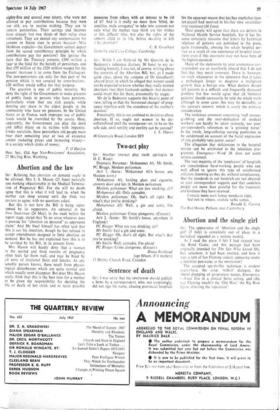Sentence of death
Sir: I was sorry that the SPECTATOR should publish a letter by a correspondent, who, not surprisingly, did not sign his name, abusing provincial hospitals for the apparent reason that his/her stepfather (sur- tax-payer) had received in his/her view unsatisfac- tory treatment (16 June).
Most people will agree that there are defects in National Health Service hospitals, but it has be- come extremely tiresome that letters by hysterical relatives of patients are published in the press, quite irrationally, abusing the whole hospital ser- vice as a result of one experience of hospital treat- ment even if this treatment may not have been of the highest standard.
Many of the statements by your anonymous cor- respondent are so manifestly absurd that I do not feel that they merit comment. There is, however, no truth whatsoever in the statement that .it takes a pathologist longer to diagnose a malignant growth than a benign one. What doctors should tell patients is a difficult and frequently discussed problem but few would agree that all 'terminal patients' should necessarily be told the whole truth although in some cases this may be desirable. in the patient's interest. which is surely the primary consideration.
The malicious comment concerning 'staff money- grubbing and the near-deification of medical workers' can hardly be taken seriously, nor your correspondent's references to 'a grinning nurse.' Is the whole, long-suffering nursing profession to be condemned on account of the facial expression of one, probably very junior, nurse?
The allegation that deficiencies in the hospital service can be attributed to the television pro- gramme, Emergency—Ward 10. does not merit serious comment.
The vast majority of the 'employees' of hospitals. are conscientious hard-working people who can well afford to ignore this type of uninformed criticism, knowing as they do, without complacency, that the standards in our hospitals are not abysmal as your correspondent suggests and that countless people are more than grateful for the treatment and kindness they have received.
Conscia mens recti famae mendacia ridet, Sed nos in vitium, credula turba sumus.






























 Previous page
Previous page